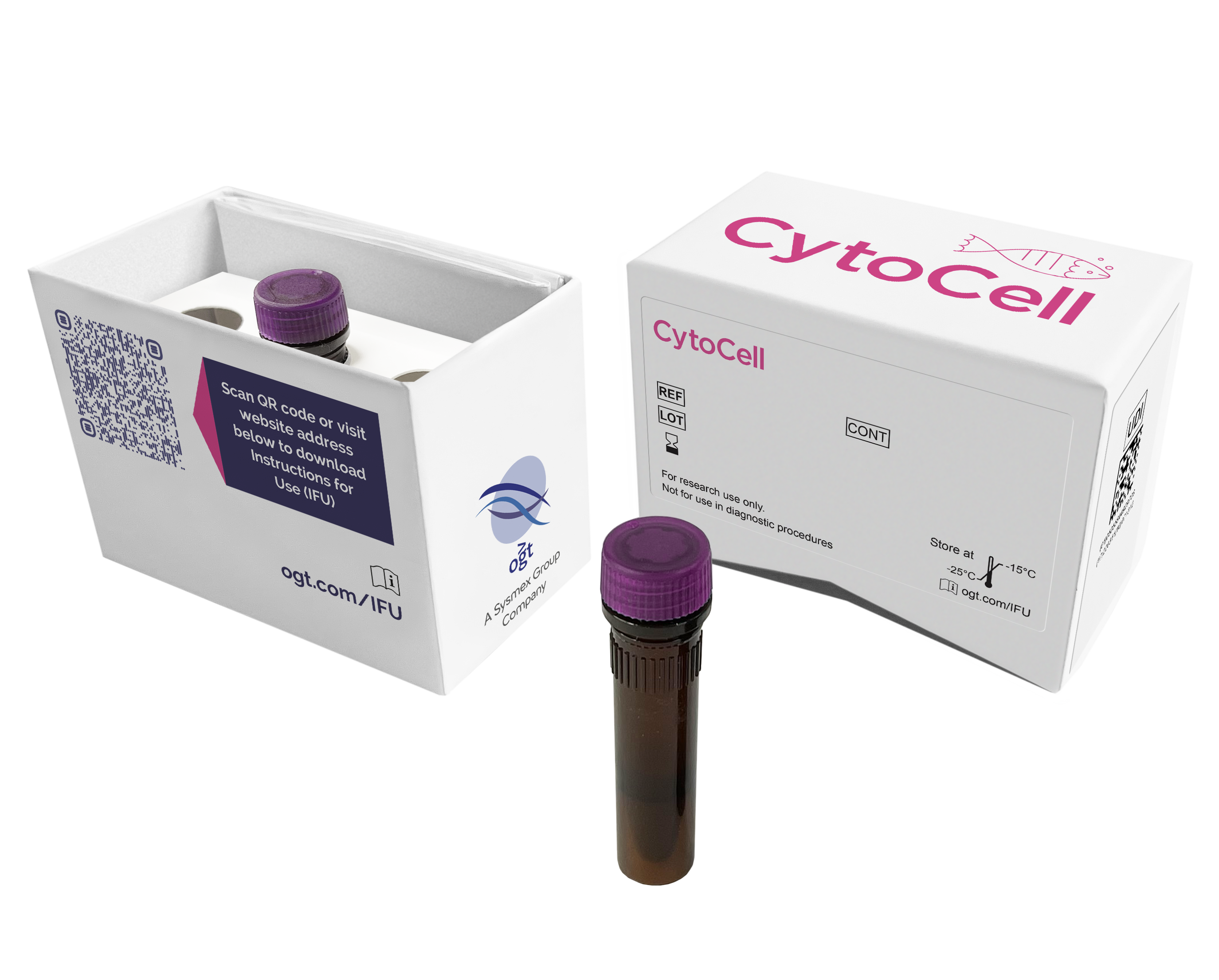
The Angelman (UBE3A/D15S10) probe is 108kb, labelled in red, covers most of the UBE3A gene and includes the D15S10 marker. The 15qter subtelomere specific probe (clone 154P1), labelled in green, allows identification of chromosome 15 and acts as a control probe.
In 70% of patients with Angelman syndrome (AS), a large de novo maternal deletion of 3-4Mb at 15q11.2-q13 is observed1,2,3. The remaining 30% of cases have underlying causes such as paternal uniparental disomy of the same region (~2%), imprinting defects (~2-3%) and mutations of the UBE3A gene1.
The UBE3A gene lies within the minimum AS critical region4 approximately 400kb telomeric to the SNRPN gene. It shows preferential expression of the maternal allele in the brain5 and is mutated in 20-30% of AS patients with normal methylation and biparental contribution of 15q11-13. It is considered to be one of the causative AS genes4,5.
The Angelman region probe covers approximately 108kb of genomic DNA, targets most of the UBE3A gene and includes the D15S10 locus. This probe may be used to identify deletions of the AS region, though it will not detect small intragenic deletions or mutations of UBE3A. The probe may also be used to help determine the nature of a Prader-Willi syndrome deletion detected with the SNRPN/Imprinting Centre probe (see LPU005). Large, 3-4Mb deletions of 15q11-13 will cause the deletion of both probe regions (SNRPN/IC and UBE3A/D15S10). Smaller deletions incorporating the IC and SNRPN, will not cause deletion of the UBE3A/D15S10 probe. These deletions may indicate a much higher risk of recurrence (possibly via grandmatrilineal inheritance) and carriers, and their families, may require further investigation6.
In vitro diagnostic (IVD)
→ English/Français/Italiano/Deutsch/Español
→ Polski
Research use only (RUO)
Find certificate of analysis documentation for our CytoCell FISH probes
Our lab has been using a wide range of CytoCell FISH probes for a number of years, and have been increasing this range all the time. The probes have clear bright signals and show good reproducibility. CytoCell provides fast delivery of catalogue probes, and are very responsive when we have any queries or problems with their products.

Bridget Manasse
Addenbrookes Hospital, Cambridge University Hosiptals NHS Foundation Trust, UK
In our hands, CytoCell FISH probes have proven to be of the highest quality with bright, easy to interpret signals, thus providing confidence in our results. OGT's customer support is outstanding, as their staff are extremely knowledgeable and truly care about their customers and their customers’ needs.

Jennie Thurston
Director of Cytogenetics, Carolinas Pathology Group, USA
I first came across CytoCell FISH probes in a previous lab I worked in and I was struck by the quality of the products. Since this time, I have been recommending and introducing CytoCell probes across all application areas — now they are the primary FISH probes used in our lab. They have an excellent range of products and their ready-to-use reagent format saves considerable time.

Elizabeth Benner
Medical Technologist, University of Arizona Health Network, USA
We have been working with CytoCell fish probes for two decades because of their excellent clarity and intensity regardless of the size of the probe. It is so clear and simple to detect.
Dr. Marina Djurisic
Head of Laboratory of Medical Genetics, Mother and Child Health Care Institute of Serbia “Dr Vukan Cupic”, Serbia
The quality and consistency of CytoCell’s probes means I can trust the results, and my clients get their results in a timely manner.

Dr. Theresa C. Brown
Director, Cytogenetics Laboratory, Hayward Genetics Center, Tulane University School of Medicine, USA
It was very important for us to have more consistent results with our probes — easy-to-read bright signals and a range of vial sizes, which is much more cost-effective.

Janet Cowan, PhD
Director of the Cytogenetics Laboratory, Tufts Medical Center, USA
Not only do CytoCell offer an extensive range of high-quality FISH probes, the customer support is also excellent — providing fast access to all the probes I need. The probes are highly consistent with bright signals allowing easy scoring of results.
Dr. Eric Crawford
Senior Director, Genetics Associates Inc., USA
The quality and reproducibility of results using the CytoCell kit has been vital in accurately detecting co-deletions in our glioma investigations. We now have a cost-effective test that we can rely on that is also easy to use and interpret. We've been consistently impressed with this kit - not to mention the support offered by OGT's customer service, and have completely transitioned over to CytoCell probes.
Gavin Cuthbert, FRCPath
Head of Cancer Cytogenetics, Northern Genetics Servce, Newcastle, UK